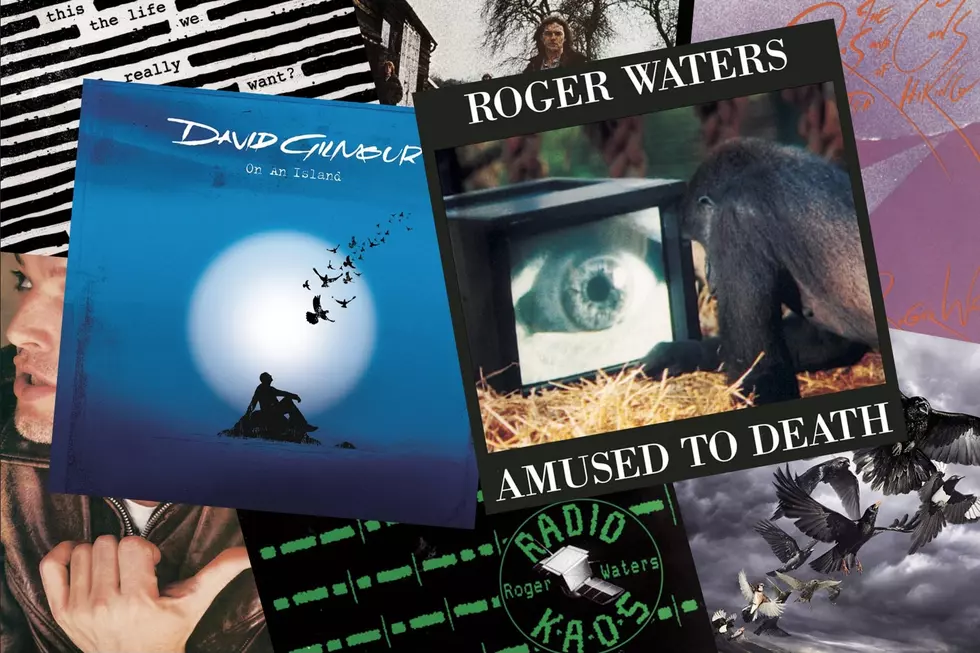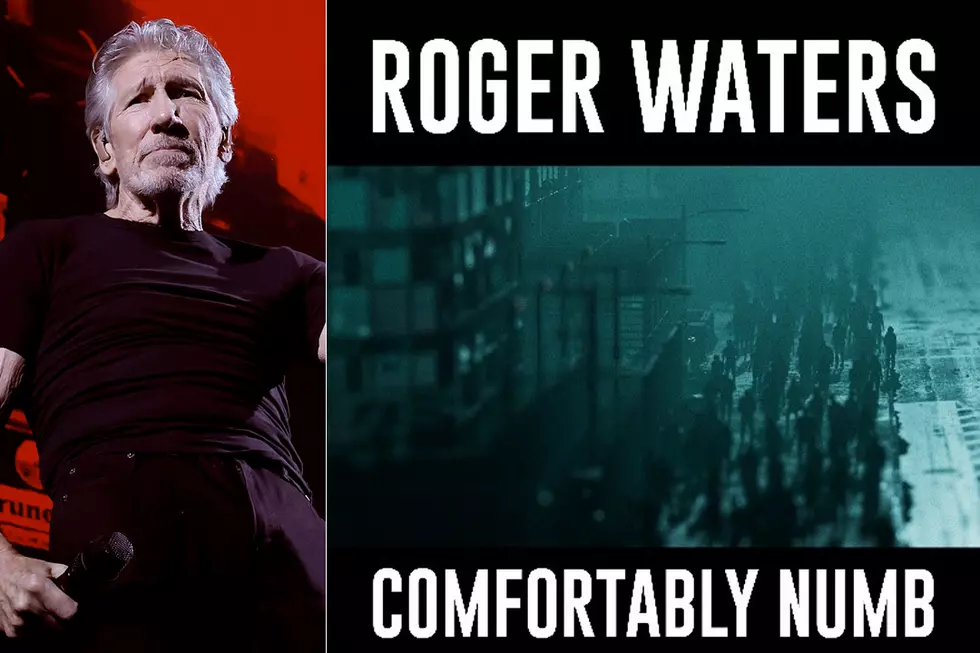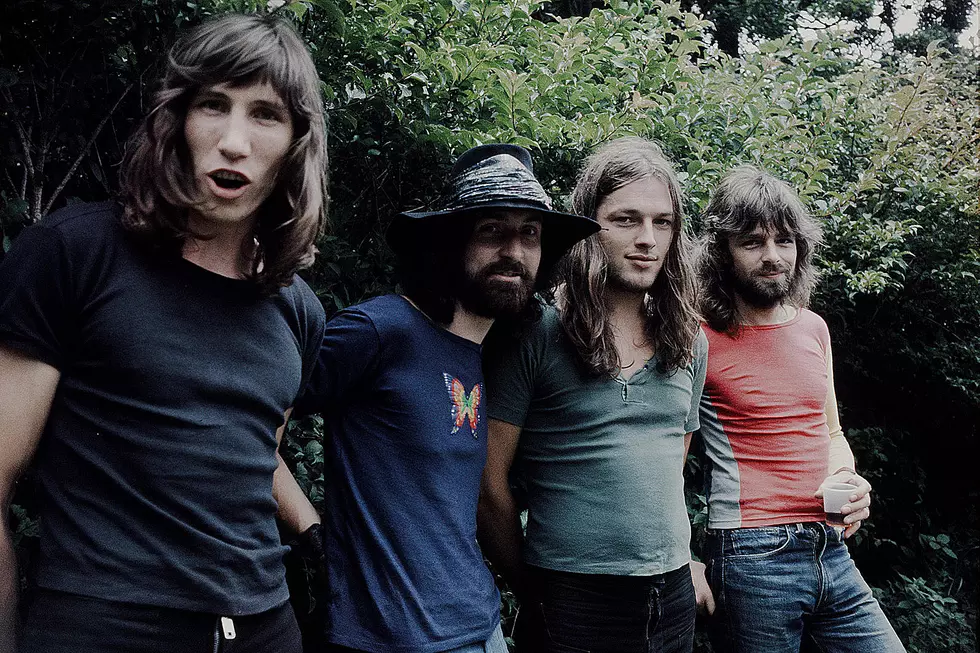
The Most Underrated Song From Each David Gilmour and Roger Waters LP
The relationship between David Gilmour and Roger Waters, it seems, was always fraught. Their shared time in Pink Floyd, the moments when they worked together most closely, brought the group's highest acclaim – including 1971's Meddle, 1973's The Dark Side of the Moon and 1975's Wish You Were Here. But it never seemed to come easy, and Gilmour receded into the background for a time.
By the end of his tenure, Waters had basically turned Pink Floyd into his backing band. Gilmour had only three shared writing credits on 1979's The Wall and none at all on 1983's The Final Cut. Even his turns as lead singer eventually whittled down to a single song on Waters' last record with the group.
Perhaps inevitably, Gilmour was the first to break away, and at least initially, that provided a safe harbor for song ideas that Waters rejected as Pink Floyd albums became more pointedly narrative. Waters, too, began his solo career with a leftover concept he'd once pitched to the others.
Soon, they'd diverge more decisively, as Waters continued crafting concept albums while Gilmour tucked away more intimate asides in between his work with the resurrected (and now Waters-less) Pink Floyd. What united them, in the end, was their incredibly slow work pace.
Together, they've released only eight rock studio albums over a period spanning several decades. Gilmour once went 22 years between solo projects; Waters waited 25 years after releasing his second record to produce a third. That's given us plenty of time to sort through the most overlooked songs from their respective solo discographies.
"Short and Sweet"
From: David Gilmour (1978)
Loose, never too deep and often instrumental, David Gilmour was anything but a knockoff of what Pink Floyd was doing (unlike, say, the Gilmour-led Momentary Lapse of Reason). This first long stride out of his main group's shadow found Gilmour reuniting with pre-Floyd collaborators in Bullitt, while revealing new wrinkles in his musical personality. "Short and Sweet" boasts a serrated guitar edge that felt like a kind of precursor to the far more widely known "Run Like Hell," but combines it with one of Gilmour's most darkly romantic vocals. To this point, he'd never sounded more personal than on this tucked-away gem. Cowritten with Roy Harper (who later issued his own version on 1980's The Unknown Soldier), "Short and Sweet" showed where Gilmour would go as a solo artist.
"Out of the Blue"
From: David Gilmour's About Face (1984)
"Out of the Blue" was said to have been at the demo stage in the run up to The Final Cut, only to be discarded along with "Murder," "Near the End" and some other loose musical threads. Instead, that uneven album was completed with leftovers from The Wall project, leaving the future of Pink Floyd very much in doubt. It's a shame: This smartly episodic track would have done much to smooth out the essentially didactic nature of Waters' finale with Pink Floyd. Beginning as a diaphanous, quietly English meditation on the suddenness of our fates, Gilmour fills the middle of "Out of the Blue" with a thunderous bit of rage, before settling into a perfectly conceived, open-ended conclusion. (This is the kind of moment that Gilmour tried for again with "On the Turning Away," from Pink Floyd's first post-Waters release, but didn't quite get there.) Combine concepts like "Out of the Blue" with the best of what Waters created for The Final Cut, and they might have gotten closer to the next great Pink Floyd album.
"5:06 AM: Every Strangers' Eyes"
From: Roger Waters' Pros and Cons of Hitch Hiking (1984)
There's a somewhat confusing daydream quality to the concept here, as Waters traces the downward trajectory of a man suffering a midlife crisis while traveling aimlessly down a dark highway between 4:30 and 5:12AM. There was also the sense that some of this solo debut might be warmed-over table scraps, as "4.50 AM: Go Fishing" includes a lyric from Pink Floyd's earlier "The Fletcher Memorial Home" and a snippet of melody from "Your Possible Pasts." In keeping, fans stayed away from the album in droves, and an accompanying tour lost steam when guest star Eric Clapton bailed. A planned film adaptation for the album, perhaps wisely, was also scrapped. Still, Waters' best songs have always been capable of standing apart from their source material. Released as a single that sank without a trace, the tale of stark lonesomeness told on "Every Strangers' Eyes" certainly does.
"Home"
From: Roger Waters' Radio K.A.O.S. (1987)
Waters' prescient message here rings true, despite being part of a plasticine, synth-laden bid for MTV acceptance. (Also, never mind an album-length narrative that even Waters seemed to acknowledge was ridiculously overcomplicated by bundling Radio K.A.O.S. with an explanatory libretto.) Taken apart from that, "Home" challenges us all to stand up to the creeping indignities that eventually coalesce into true injustice. Waters eventually hits on a riff, talking about any number of unexpected personalities who might one day provide the greatest danger to our everyday lives: "Could be a lover, could be a fighter; could be a super heavyweight, or it could be something lighter." Along the way, he neatly presupposes the sweeping fear that eventually gripped the U.S. in the wake of 9/11.
"Watching TV"
From: Roger Waters' Amused to Death (1992)
Perhaps Waters' best take on the conflict within organized religion (and that's saying something) was found on Amused to Death with "What God Wants, Pt. 1." Equally trenchant is his contempt for warlords in "The Bravery of Being Out of Range." But it's not like they broke new ground. Instead, the album's most underrated song finds Waters in a duet with Eagles' Don Henley on "Watching TV," perhaps the most boldly beautiful thing he's ever done. It's a welcome respite from the usual polemics, even if a political current still runs just beneath the surface of this meditation on the 1989 Chinese youth movement against Communism. Waters' sound also opened up on Amused to Death: With the help of Jeff Beck (to say nothing of longtime orchestral collaborator Michael Kamen, who'd earlier worked on The Wall and The Final Cut), Waters' music once again matched his vocal intensity.
"Pocketful of Stones"
From: David Gilmour's On an Island (2006)
An excruciatingly beautiful song, "Pocketful of Stones" connects with the same shattering sense of loss that defined Wish You Were Here — stirring in a bit of the time-is-running-short themes from The Dark Side of the Moon — but with a contemplative orchestral counterpoint from Zbigniew Preisner that adds oaken new depths. The vocal is quietly confidential, strikingly open and perhaps Gilmour's most sensitive work ever at the mic. Together, they make "Pocketful of Stones" simultaneously wonder-filled and so very still. It's a song with darkness around the edges that couldn't be less like what we've come to expect from Gilmour as a member of Pink Floyd. Instead, "Pocketful of Stones" completed his solo persona. The song ends with another purpled flourish by Preisner, and that only adds to its cobalt-hued sense of desolation.
"A Boat Lies Waiting"
From: David Gilmour's Rattle That Lock (2015)
On an Island was followed by Pink Floyd's almost completely instrumental farewell The Endless River, continuing a period that evolved into this almost confining quietness. As gorgeous as these largely meditative albums no doubt were, some may have wished they'd more often shaken free of such steadfast reserve. Thankfully, the more rock-focused Rattle That Lock served as a needed reminder that Gilmour could still cut loose – in particular on "Today," and its title track. The truth is, however, that Gilmour remained in mourning over the loss of his longtime Pink Floyd bandmate Richard Wright, who succumbed to cancer in 2008. So, there was still room for "A Boat Lies Waiting," his heartbreakingly tender goodbye.
"Picture That"
From: Is This the Life We Really Want? (2017)
Waters returned with Is This The Life We Really Want? during a time of political turmoil. No surprise then that the album is among his most confrontational – but, in a surprising turn of events, also his most musically nostalgic: "Smell the Roses" boasted stabbing guitars that recall Pink Floyd's "Pigs (Three Different Ones)," while "Deja Vu" features a Wall-like orchestral sweep. "Picture That," the album's most underrated moment, held whispers of "Welcome to the Machine." Inside, like so many others here, it's a biting portrait of a world teetering on collapse. "Picture a shithouse with no fucking drains," Waters seethes at one point. "Picture a leader with no fucking brains." Elsewhere, he plumbs new emotional depths on "Wait for Her." But "Picture That" is vintage Waters vitriol for a new age.
The Best Song From Every Pink Floyd Album
You Think You Know Pink Floyd?
More From The Moose 94.7 FM










